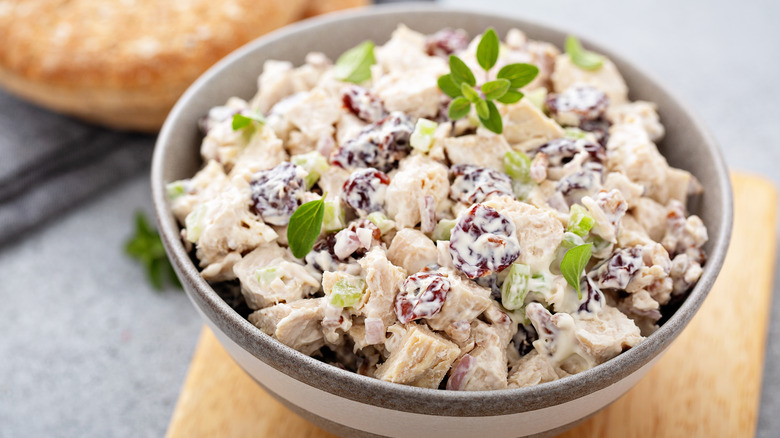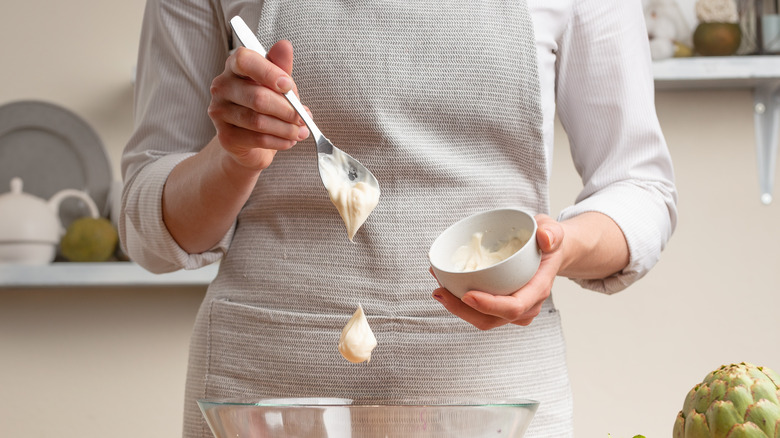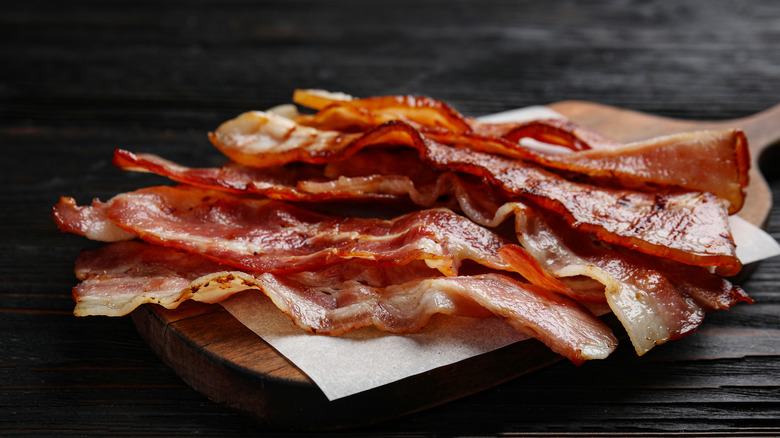Chicken Salad Can Be Frozen, But Here's What Will Happen
The chicken salad is an all-American classic that turns up everywhere from Costco to your cousin's barbecue. With all this salad going around, you'll likely have leftovers and wonder if it can be frozen. Or perhaps you're making it in bulk, or traveling a long way for lunch (to that cousin's barbecue, perhaps?) and don't want the chicken salad you made to perish on the journey. The good news is that yes, chicken salad can be frozen. Once you've thawed it, however, it's never going to be quite the same as it was before it was frozen.
What happens to your chicken salad after freezing and thawing depends on what ingredients you're using, the condition they're in when frozen, and accepting that you'll never fully restore your chicken salad to its former glory. Once defrosted, a typical chicken salad becomes substantially less appealing. Colors fade and darken, textures become mushier, tastes alter and mellow, and high-moisture ingredients release water during thawing, leaving you with a limp, soggy salad.
Mayonnaise poses one of the main challenges when it comes to freezing. The emulsion of egg and oil is broken by tiny ice crystals which form, causing oil to seep out from the mayonnaise and make your salad oily as it thaws. Alternative sources of creaminess like yogurt or creme fraiche won't fare much better: Both will separate when frozen, releasing water as they defrost.
What to know before freezing and thawing a chicken salad
Although most creamy binders like mayonnaise will separate when frozen, there are other tricks to help make a chicken salad as appetizing as possible once thawed. First, though, the most important thing is safety: If your chicken salad is more than three days old it shouldn't be frozen at all. Likewise, if it's been left at room temperature for more than two hours, it probably won't be a pleasant prospect once it's thawed, and could even make you sick.
If you're making chicken salad from scratch and are planning to freeze it, don't mix all the ingredients. Keep the mayonnaise (or alternative if you're using something else) separate, refrigerate it, and stir it in just before serving your fully defrosted salad. Instead of the mayo, give your salad a drizzle of olive oil before freezing to help lock in flavors and protect all the other ingredients.
Your chicken salad should be defrosted within three months of freezing, and once defrosted you should eat it within one or two days. Leave your salad to defrost slowly in the fridge in a sealed container for 24 hours, then pick out any ugly parts that didn't thaw well, and bring it back to life a little with some seasoning, fresh mayonnaise (or equivalent), and maybe some extra ingredients to add texture and flavor: nuts, fresh herbs, or cucumber, for example. Make sure to stir everything well so any separated liquids can reincorporate.
Which ingredients to use for a freezer-friendly chicken salad
The author Myrtle Reed, writing under the wonderful culinary pseudonym Olive Green in her 1909 cookbook One Thousand Salads, includes 31 variations of chicken salad (she also has one for 'jellied chicken salad' which appears, thankfully, to have gone out of fashion these days). Many of her recipes feature alternatives to the usual main ingredients of chicken, mayonnaise, celery, and grapes, and others include wide-ranging additional ingredients, from Brazil nuts to sweetbreads; It shows that, beyond chicken, there's plenty of flexibility about which ingredients should be included in chicken salad.
There are plenty of ingredients to help you level up your chicken salad, but we're going to focus now on what will work best (and worst) for freezing. One relatively common chicken salad ingredient to avoid if freezing is boiled eggs: the egg white becomes rubbery and unpleasant when frozen, and the FDA specifically does not advise freezing hard-boiled eggs. Also, anything salad or vegetables that are crunchy and contain lots of water will lose this crunch when frozen, so you may want to add in celery and onions after thawing. On the other hand, dry foods like nuts freeze really well, so you could try adding sliced almonds to make a Waldorf-style chicken salad. Bacon is another option to consider: While it won't remain crispy when thawed, it'll still be tasty. Plus you can always pick out the rashers and re-crisp them in a frying pan with some oil.


